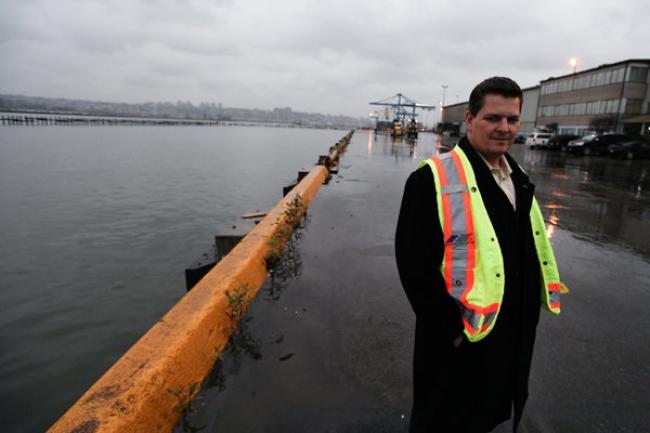Articles Menu

A contentious coal facility planned at Fraser Surrey Docks has been scuttled by the Port of Vancouver
In 2014, the port approved a plan for coal to be loaded onto barges for transport to Texada Island on to ships bound for Asia. The project was amended in 2015 to allow for direct loading onto ocean-going ships in the Fraser River.
The company argued that the change would have meant 80 ships compared with 640 barges on the lower Fraser, including arrivals and departures, but communities such as Surrey and New Westminster remained adamantly opposed to the project.
Port spokesperson Danielle Jang confirmed on Friday, Feb. 1 that the 2015 approval came with 83 conditions that “must be adhered to” and that the project permit had been cancelled because the company had failed to show substantial progress by the required date.
The port is managed by the Vancouver Fraser Port Authority, which handles permitting applications.
Calls to Fraser Surrey Docks president Jeff Scott went unanswered.
Sudden cancellation of the project permit received a jubilant response from opponents.
“This was an extremely controversial project, facing opposition at every step of the way,” Ecojustice lawyer Fraser Thomson said. “This is really good news, definitely a win for the climate and for local communities who spent years tirelessly fighting against this project.”
Fraser Surrey Docks had been embroiled in conflict for years over the coal facility, critics arguing the project is bad for the environment and public health.
Ecojustice, representing the group Communities and Coal Society and two local residents, argued in federal court in 2017 that the port’s approval process was not impartial and that senior port officials stood to benefit from approval based on the port’s bonus system.
If built, the facility would have resulted in up to four million tonnes of thermal coal per year from Wyoming’s Powder River Basin coming through Metro Vancouver via open-car rail, Ecojustice warned. An estimated seven million tonnes of carbon dioxide — a leading greenhouse gas — would have gone into the atmosphere annually, it added.
“Burning coal for electricity really has no place in a world that is serious about fighting climate change,” Thomson said. “An end to this project is a step in that direction.”
Paula Williams, a resident of south Surrey, helped garner more than 11,000 signatures along the rail route seeking an independent health assessment before approval of the project. People feared the impact of diesel particulates and coal dust, as well as emissions contributing to climate change.
“This should be seen as a victory,” Williams said. “It’s fantastic news. Maybe Fraser Surrey Docks knows this ship has sailed and... they’ll focus on something with less environmental impact.”
Clark Williams-Derry, director of energy finance at the Seattle-based Sightline Institute, a non-profit promoting green economies, said that Fraser Surrey Docks likely decided not to proceed with the project due to the volatility of Asian coal markets. Political decisions by importing countries can dramatically lower import prices, including through decisions aimed at reducing smog in major cities or favouring renewal energy sources.
“It’s a very risky business,” he said. “China can, with a stroke of the pen, create or destroy demand for tens of millions of tonnes of coal.”
Fraser Surrey Docks describes itself as the largest modern, multi-purpose marine terminal on the west coast of North America, handling 300 to 400 deep-sea vessels per year. ![]()
[Photo: Jeff Scott, president and CEO of Fraser Surrey Docks, whose proposed coal transfer project will not go ahead. Photo by David P. Ball for The Tyee.]